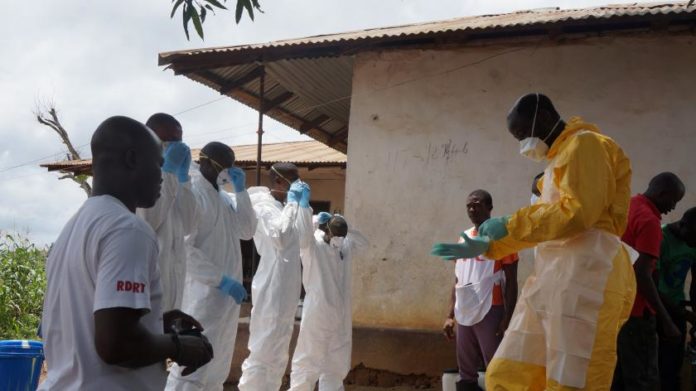
The number of new Ebola cases rose for the second week in a row in West Africa, nearly doubling in Guinea, suggesting declines in the disease seen earlier this year had stalled, the World Health Organization said in its latest situation report.
Efforts to wipe out the deadly virus are being hampered by people’s mistrust of health workers, and the number of people continuing to hide sick friends and relatives from authorities, particularly in Guinea’s capital Conakry, officials said.
West Africa recorded 144 new confirmed cases of Ebola in the week to Feb. 8 compared with 124 the previous week, the WHO said in a report.
“Despite improvements in case finding and management, burial practices, and community engagement, the decline in case incidence has stalled,” the U.N. agency said.
In Guinea, where the outbreak began, there were 64 new cases compared with 39 the previous week. The WHO said the increase has been driven mainly by transmission in the capital, Conakry, and in the western prefecture of Forecariah, where last Sunday two Red Cross workers were beaten while trying to conduct a safe burial for Ebola victims.
Less than a week later, on Saturday, locals attacked an Ebola facility and a group of Red Cross aid workers in central Guinea, forcing them to flee and further complicating efforts to track down and isolate infected patients. According to the Red Cross, Ebola workers in Guinea are being attacked an average of 10 times per month, which the charity warned is hampering progress towards controlling the outbreak and “giving the virus an upper hand”.
Guinea’s President Alpha Conde has announced a plan to have no Ebola cases by early March, but with cases on the rise that seems highly unlikely at this point. And in an illustration of the remaining challenges, a crowd of youth from the Conakry suburb of Yimbaya spilled onto the streets on Monday, burning tires in protest after an imam suspected of conducting a secret Ebola burial was detained by authorities.
Fear and hostility towards aid workers in the region is thought to be tied to a series of rumors and conspiracy theories, including the belief that the virus was planted by Western governments and that spraying disinfectants is part of a plot to infect locals.
The U.N. said this week that 70 schools across the country had been unable to open because of local suspicions of medical kits being distributed to students.
The worst outbreak on record has now killed at least 9,177 people out of 22,894 recorded cases, mainly in the three worst-affected West African nations, Guinea, Sierra Leone and Liberia. Sierra Leone remains the country with the highest transmission, although case numbers dropped week-on-week to 76 from 80. Liberia, once the epicentre of the outbreak, reported just three cases in the same period.
President Barack Obama said on Wednesday he was bringing back nearly all U.S. troops fighting the Ebola epidemic in West Africa and marking a new phase in the battle to help countries “get to zero” cases. Guinea has the longest way to go in ending the outbreak, he added.
Obama said wealthy countries needed to invest to ensure that poor nations have basic health systems to detect and fight diseases.
“This is not charity,” he said in a speech at the White House. “The investments we make overseas are in our self-interest.”
